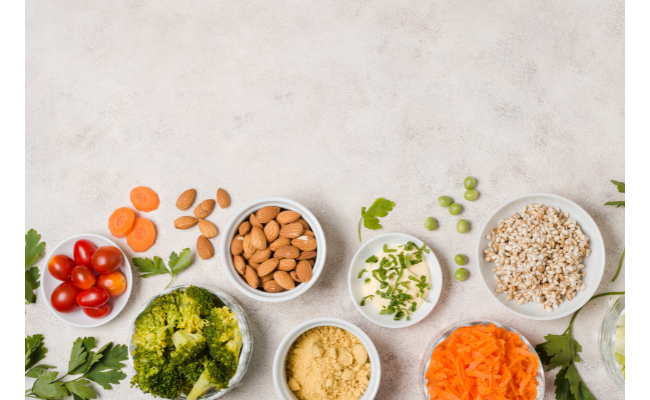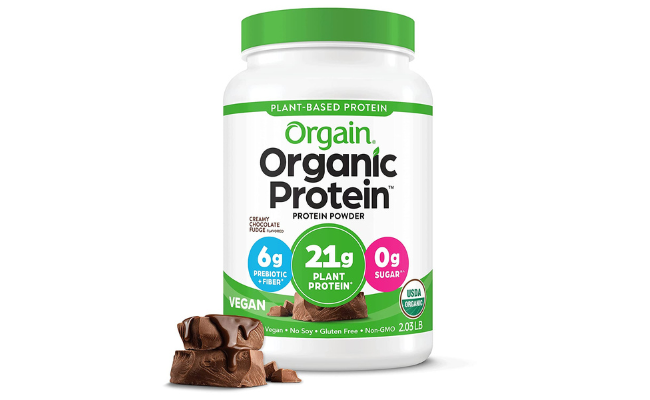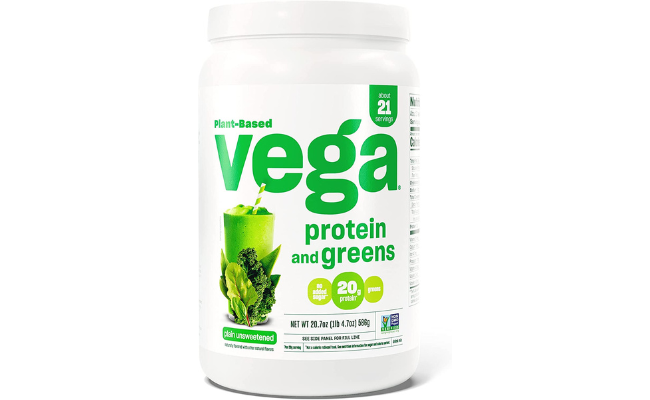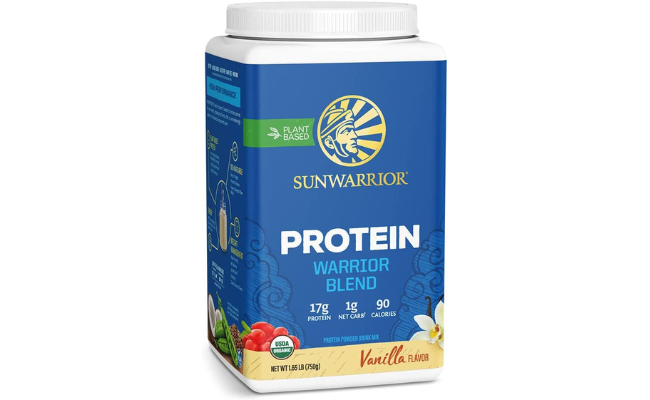How to Choose the Right Vegan Protein Powder
Are you searching for the perfect plant-based protein to fuel your workouts and boost your health? If so, you’ve likely heard of the best vegan protein powder options in the fitness community.
These organic, plant-based dietary supplements have surged in popularity among health-conscious individuals seeking a sustainable, allergy-friendly alternative to animal-based protein powders.
In this article, we’ll explore the benefits, types, and uses of this protein powder. We’ll also help you choose the right one for your needs based on research and personal interest.
How Much Protein Do You Need?
Before we dive into vegan protein powder, understanding how much protein you need daily is essential. Remember, protein requirements vary on a person’s age, sex, activity level, and individual health goals. Here, we’ll provide some general guidelines to help you determine your optimal protein intake.
Recommended Dietary Allowance (RDA) for Protein
The Recommended Dietary Allowance (RDA) for protein is the minimum amount of protein required to meet the basic nutritional needs of most healthy individuals. According to the National Academy of Medicine, the RDA for protein is as follows:
- 0.8 grams of protein per kilogram of body weight for adults (both men and women)
- 1.2 to 1.52 grams of protein per kilogram of body weight for pregnant and breastfeeding women
To calculate your daily protein needs based on the RDA, multiply your body weight in kilograms by the recommended protein amount. For example, a 70-kilogram adult would require 56 grams of protein per day (70 kg x 0.8 g/kg = 56 g).
Protein Intake for Active Individuals and Athletes
Active individuals and athletes often have increased protein needs to support muscle repair, growth, and overall performance. The International Society of Sports Nutrition (ISSN) provides the following recommendations for daily protein intake in active individuals:
- 1.4 to 2.0 grams of protein per kilogram of body weight for endurance athletes
- 1.6 to 2.2 grams of protein per kilogram of body weight for strength and power athletes
For example, a 70-kilogram endurance athlete may require between 98 and 140 grams of protein daily (70 kg x 1.4 g/kg to 70 kg x 2.0 g/kg).
Protein Intake for Weight Loss and Muscle Gain
Protein plays a crucial role in both weight loss and muscle gain. Consuming enough protein can help you feel full, reduce overall calorie intake, and preserve lean muscle mass during weight loss. For muscle gain, protein provides the building blocks necessary for muscle repair and growth.
Research suggests that higher protein intake may increase weight loss. The study suggests 1.6 to 2.2 grams per kilogram of body weight may help you lose weight or build muscle mass. However, weight loss or building muscle mass depends on individual goals and activity levels.
Individual Factors and Protein Needs
Individual protein needs can vary based on factors such as age, sex, body composition, and overall health. Older adults, for instance, need a high-protein diet to help preserve muscle mass and prevent age-related muscle loss.
But first, consult with a registered dietitian, nutritionist, or healthcare professional before getting any supplements. These professionals can help you determine your specific protein requirements. They can also develop a personalized nutrition plan tailored to your individual needs and goals.
Benefits of Vegan Protein Powder
Discovering the benefits of vegan protein powder is essential when comparing it to popular options like whey protein. As a plant-based alternative, vegan protein powders offer unique advantages for various dietary preferences and health goals.
In this section, we’ll explore various vegan protein powder benefits. We’ll also examine health, environmental, and ethical considerations to help you make an informed decision about your protein supplement choice.
Health Benefits
Vegan protein powder offers several health benefits. It’s easy to digest, has hypoallergenic properties, and often has lower saturated fat and cholesterol levels than animal-based protein powders. Many plant-based protein sources are also rich in vitamins, minerals, and antioxidants, which can support overall health.
Environmental Benefits
Choosing vegan protein powder over animal-based options can also have environmental benefits. Plant-based protein sources generally require less land, water, and energy to produce. This makes them a more sustainable choice for those concerned about their ecological footprint.
Ethical Benefits
For individuals concerned about animal welfare, vegan protein powder is a cruelty-free alternative that aligns with their ethical values.
Comparison to Animal-Based Protein Powders
Animal-based protein powders may have higher protein content per serving. Alternatively, vegan protein powders often contain a more diverse nutrient profile. Some plant-based options can also be easier to digest for those with sensitivities to dairy or eggs.
Types of Vegan Protein Powder
With vegan protein powders, you have a diverse range of plant-based sources to choose from. Each offers unique nutritional benefits to aid you in your goals. Let’s explore various types of vegan protein powders to help you find the perfect match for your dietary needs and preferences.
Pea
Pea protein powder is an excellent plant-based source of protein. Derived from yellow peas, pea protein powder boasts a strong essential amino acid profile. It’s a popular choice for those with soy or gluten allergies and has a mild, slightly nutty taste.
Soy
Soy protein powder is another type of protein powder from defatted soybean flakes. Experts consider soy as one of the few complete plant-based proteins, containing all nine essential amino acids. It’s a versatile option with a smooth texture and neutral taste.
Brown Rice
Brown rice protein powder comes from sprouted brown rice and is hypoallergenic. This property makes it suitable for those with allergies or sensitivities. It’s not a complete protein. Still, you can combine it with other plant-based protein powders to create a more balanced amino acid profile.
Hemp
Hemp protein powder comes from hemp seeds and is a complete protein containing all essential amino acids. It’s also a good source of healthy fats, fiber, and minerals. Hemp protein powder has an earthy, slightly nutty taste.
Pumpkin Seed
Pumpkin seed protein powder is made from cold-pressed pumpkin seeds. It is rich in essential amino acids, healthy fats, and minerals. It has a smooth texture and a slightly sweet, nutty flavor.
Blended Vegan Protein Powders
Blended vegan protein powders combine multiple plant-based protein sources. The blend creates a more balanced essential amino acid profile, often including pea, brown rice, and hemp proteins.
How to Choose the Best Vegan Protein Powder
Nutritional Content
When selecting a vegan protein powder, consider its nutritional content, particularly its essential amino acid profile. Look for options that provide a complete or near-complete essential amino acid profile to support muscle growth and recovery.
Price
Vegan protein powders can vary in price. Most highly rated products are as affordable as $1.50 per ounce. But first, determining your budget is critical when comparing the cost per serving of different options. This way, you can find one that offers the best value for your goals.
Taste
Taste is subjective, and preferences vary from person to person. Experiment with different flavors and types of vegan protein powders to find the one you enjoy the most. Reading reviews or asking for recommendations can help guide your decision.
Quality
Pay attention to the quality of the ingredients and the manufacturing process. Look for protein powders that are minimally processed and made from high-quality, whole-food sources.
Brand Reputation
Do some research on the brand’s reputation and its commitment to quality, sustainability, and ethical practices. Reading reviews and seeking testimonials can offer insight into the overall satisfaction of other customers.
Certifications
Look for certifications such as Organic, Non-GMO, Halal, or third-party tested. These certifications provide an additional level of assurance regarding the product’s quality and safety.
Halal-certified vegan protein powders ensure the product adheres to Islamic dietary guidelines. These guidelines ensure the product is free from any ingredients or processing methods that are not permissible under Islamic law.
This certification is particularly important for Muslim consumers who want to ensure their protein supplements align with their religious beliefs.
Best Vegan Protein Powders in 2023
If you’re looking for the best vegan protein powder options, look no further! This section lists the top three options for 2023. We took user reviews, pros and cons, price, and other criteria when choosing these picks.
1. Best-Seller
Orgain Organic Vegan Protein Powder
Price: $10.99–$36.99
Orgain Organic Protein Powder is a plant-based protein supplement designed to support your active lifestyle and nutrition goals. This vegan-friendly powder boasts a blend of organic pea, brown rice, and chia seed proteins, providing 21 grams of protein per serving.
It’s a healthy, delicious, and sugar-free option for those seeking a clean, gluten-free, soy-free, and non-GMO protein source to fuel their workouts and daily activities.
About this product
- Brand: Orgain
- Diet type: USDA Organic, vegan, Kosher, gluten-free
- Protein source: Blend (pea, brown rice, chia seeds)
- Protein per serving: 21 grams
Pros
- Plant-based
- Organic ingredients
- No added sugar
- Gluten-free, soy-free, non-GMO
- Multiple flavor options
Cons
- It may not be suitable for those with specific allergies
- Higher price compared to other options
- Some users may prefer a different texture or taste
2. Vega Protein and Greens Vegan Protein Powder
Price: $24.47–$38.44
Vega Protein & Greens is a versatile vegan protein powder that provides 20 grams of plant-based protein per serving and two servings of nutrient-dense greens. This vegan-friendly supplement combines pea, brown rice, and sacha inchi proteins.
You also get the goodness of spinach, kale, and broccoli, making it an all-in-one solution for their protein and greens intake.
About this product
- Brand: Vega
- Diet type: Vegan
- Protein source: Blend (pea, greens)
- Protein per serving: 20 grams
Pros
- Includes two servings of greens
- Various protein sources
- Gluten-free, soy-free, non-GMO
Cons
- Higher price for lower protein content compared to other brands
3. Sunwarrior Vegan Protein Powder with BCAA
Price: $40.47
Sunwarrior Warrior Blend Protein is another premium vegan protein powder that offers a unique blend of organic plant-based proteins. These include pea, hemp, and goji berry.
With 17 grams of protein per serving, this gluten-free, soy-free, and non-GMO supplement is perfect for health-conscious individuals looking to support their active lifestyles and nutrition goals.
About this product
- Brand: Sunwarrior
- Diet type: Vegan
- Protein source: Organic hemp seed
- Protein per serving: 17 grams
Pros
- Plant-based
- Unique blend of organic protein sources (pea, hemp, and goji berry)
- Gluten-free, soy-free, non-GMO
Cons
- Container size may be smaller than expected
How to Use Vegan Protein Powder
Vegan protein powder is a versatile ingredient to add to vegan protein snacks or post-workout meals. Let’s explore ways to use this supplement, from smoothies to baked goods, to help you make the most of its benefits.
Smoothie Recipes
Vegan protein powder can easily be added to smoothies, providing an extra boost of protein and nutrients. Combine your favorite fruits, vegetables, and plant-based milk for a delicious and nutritious treat with no added artificial sweeteners.
Green Power Protein Smoothie
Ingredients
- 1 scoop of your favorite vegan protein powder
- 1 cup of spinach or kale
- 1/2 banana
- 1/2 cup of mixed berries (fresh or frozen)
- 1 tbsp chia seeds or flaxseeds
- 1 cup of unsweetened almond milk or any plant-based milk
Instructions
- Combine all ingredients in a blender.
- Blend until smooth and creamy.
- Pour into a glass and enjoy your nutritious and protein-packed smoothie.
Baking Recipes
You can also incorporate vegan protein powder into your baking recipes, such as pancakes, muffins, or energy bars. These help increase the protein content of your favorite treats without altering the taste significantly.
Vegan Protein Banana Muffins
Ingredients
- 2 cups whole wheat or oat flour
- 1/2 cup vegan protein powder (vanilla or unflavored)
- 1/2 tsp baking soda
- 1/2 tsp baking powder
- 1/2 tsp cinnamon
- 1/4 tsp salt
- 3 ripe bananas, mashed
- 1/3 cup unsweetened applesauce
- 1/4 cup maple syrup or agave nectar
- 1 tsp vanilla extract
Instructions
- Preheat oven to 350°F (175°C). Grease or line a muffin tin with paper liners.
- In a large bowl, whisk together flour, protein powder, baking soda, baking powder, cinnamon, and salt.
- In a separate bowl, mix mashed bananas, applesauce, maple syrup, and vanilla extract.
- Stir the wet ingredients into the dry ingredients until just combined.
- Divide the batter evenly among the muffin cups.
- Bake for 20–25 minutes or until a toothpick inserted into the center of a muffin comes out clean.
- Remove from oven.
- Let cool in the tin for 5–10 minutes before transferring to a wire rack to cool completely.
With Water or Milk
For a quick and easy protein fix, mix your vegan protein powder with water or your preferred plant-based milk. This convenient post-workout shake is perfect as a snack between meals.
Simple Vegan Protein Shake
Ingredients
- 1 scoop of your favorite vegan protein powder
- 1 1/2 cups of water or plant-based milk (such as almond, oat, or soy milk)
- Optional: ice cubes
Instructions
- In a shaker bottle or blender, combine the vegan protein powder with water or plant-based milk.
- Add ice cubes if desired for a colder shake.
- Shake or blend until smooth and well combined.
- Pour into a glass and enjoy your quick and easy protein shake.
Post-Workout Timing
Consume your vegan protein powder within 30 minutes to an hour after exercising like other protein powders on the market. This timing can help support muscle recovery and growth. Don’t forget to eat your meals after working out!
How Vegan Protein Powder Can Aid Weight Loss
Vegan protein powder can help support weight loss by helping you feel fuller for longer and reducing overall calorie intake. Protein also plays a role in maintaining and building lean muscle mass, which can contribute to a higher metabolism.
Best Vegan Protein Powder for Weight Loss
Look for vegan protein powders with lower calorie counts and minimal added sugars. Those high in fiber or with added thermogenic ingredients may also support weight loss efforts.
Adding Vegan Protein Powder into Your Weight Loss Plan
Combine vegan protein powder with a balanced diet and regular exercise for optimal weight loss results. Consider using it as a meal replacement or snack to help control portion sizes and calorie intake.
Vegan Protein Powder for Muscle Gain
Vegan protein powder provides the essential amino acids your body needs for muscle repair and growth. This makes it a valuable addition to a muscle-building routine.
Best Vegan Protein Powder to Gain Muscle Mass
Choose vegan protein powders with higher protein content and a complete essential amino acid profile to support muscle growth. Blended protein powders can offer a more balanced amino acid profile.
Adding Vegan Protein Powder into Your Muscle-Building Routine
Consume sufficient vegan protein powder alongside a well-rounded diet and strength-training program to support muscle growth. Aim for 1.2 to 2.2 grams of protein per kilogram of body weight per day, depending on your activity level and goals.
Common Myths and Concerns
Protein Quality
Plant-based proteins may have lower biological values compared to animal-based proteins. However, consuming a variety of plant-based proteins or using blended vegan protein powders can help achieve a complete amino acid profile.
Digestibility
Some plant-based proteins, like brown rice and pea proteins, are easy to digest. This makes them suitable for those with sensitivities to dairy or eggs. However, remember that individual tolerance varies. Some people may find certain plant-based proteins more digestible than others.
Hormonal Issues
Concerns about soy protein and its potential impact on estrogen levels have been widely debated. However, research suggests that moderate soy consumption does not have significant hormonal effects in most people. If you’re concerned, consult with a healthcare professional before incorporating soy protein into your diet.
Final Thoughts
Vegan protein powder offers numerous health, environmental, and ethical benefits. It’s no wonder it’s a popular choice for those seeking plant-based protein alternatives.
When purchasing this supplement, take into account nutritional content, price, taste, quality, and brand reputation. Give vegan protein powder a try and discover the benefits for yourself!
FAQs: Is Vegan Protein Powder Worth It?
1. What is vegan protein powder?
Vegan protein powder is a dietary supplement made from plant-based protein sources. It serves as an alternative to animal-based protein powders, catering to those with dietary restrictions, ethical considerations, or specific health goals.
2. Why should I choose vegan protein powder over animal-based protein powder?
Vegan protein powder offers easy digestibility and hypoallergenic properties for some people. It also supports environmental sustainability and ethical concerns regarding animal welfare.
3. What are the main types of vegan protein powder?
Common types of vegan protein powders include pea, soy, brown rice, hemp, and pumpkin seed protein powders. Each type has unique amino acid profiles and tastes.
4. How do I choose the best vegan protein powder?
Consider the nutritional content (including essential amino acid profile), price, taste, quality, brand reputation, and certifications. Experiment with different types and brands to find the one that suits your preferences and dietary needs.
5. Can vegan protein powder help with weight loss and muscle gain?
Vegan protein powder can support both weight loss and muscle gain—with a healthy diet and exercise plan, of course! Protein helps with keeping you feeling full and reduces overall calorie intake. Consuming sufficient protein, including from vegan protein powders, is crucial for muscle repair and growth after exercise.
Editor’s Note: This post was originally published on May 3, 2023, and has been updated on May 13, 2023.
As an Amazon Associate INQUIRER.net will earn from qualifying purchases.








